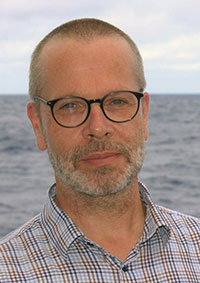05-MMG-OC1 Magmatic and Hydrothermal Processes
Representative Wolfgang Bach
Module covers (1) mantle melting in rifts, plumes, and subduction zones, (2) melt segregation and melt-rock interation in the crust-mantle transition zone, (3) magmatic differentiation by crystallization and assimilation, and (4) seawater-crust exchange (including hydrothermal vents). We will use theory of phase relations and literature reviews in class and do thin section microscopy and handling of geochemical data in the practical part of the module.
1) Students understand phase relations and mass balance constraints of mantle melting and magmatic differentiation.
2) Students are able to use thin section microscopy to determine textures and phase assemblages and turn these observations into models of rock formation.
3) Students know how to work with rock geochemical data and interpret the results.
4) Students understand the role of ocean crust formation and alteration in System Earth.
Course Type 1: Lecture, Exercise (L+E) 4.0 SWS ( 56.0 h)
Tutorial(s): -
Workload:56.0 h presence time
68.0 h self-study
56.0 h exam workload
180 h total workload
module exam
exam elements: 1
SL: 0
100 % assignment
1) Searle M, Mid-ocean ridges, Cambridge University Press
2) Winter J, Introduction to Petrology, Cambridge University Press
3) Best MC & Christiansen EH, Igneous petrology, Blackwell Science
4) Raith MM, Raase P & Reinhardt J, Thin section microscopy, ISBN 978-3-00-037671-9 (PDF)
Basic Data
Master Marine Geosciences
Module Type
Compulsory
First Year of Study
Offering Departement
Wintersemester
Course LanguageEnglish
6 CP
4 SWS
Contact

Contact
Prof. Dr. Wolfgang Bach
GEO 5340
 uni-bremen.de
uni-bremen.deContact

Contact
Prof. Dr. Wolfgang Bach
GEO 5340
 uni-bremen.de
uni-bremen.de
